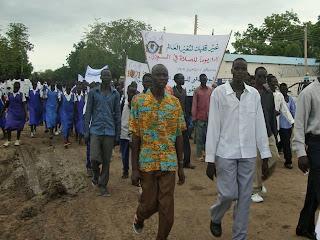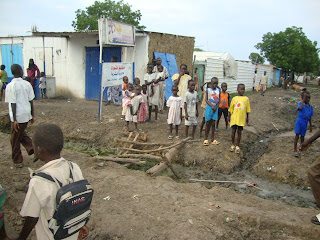53. Unite or Divide
It seems to be a simple choice: stay as one country or divide into two countries: unity or secession by the Southern Sudanese people. While the final outcome may be a stark choice of one nation or two, the reality for those in this country is far more complicated and the referendum scheduled for January 9th, 2011, is already impacting on the lives of many people. The most important outcome for which we pray is peace, not war, but even if the peace is maintained, considerable disruption looms to the pattern of daily living.
A few days ago, I met Father Caesar, Vicar General of the Archdiocese of Juba. He said:
‘I am always optimistic for peace: we don’t want war. I came from a family of nine. Now they are all dead, except me. There is no-one behind me and no-one in front of me as a result of that stupid war. I am totally on my own!’
So are many of the street children who put out their hands pleading: ‘One pound, one pound!’ to any passing ‘kawadja’ (white person).
Registration of voters begins mid-November. It is critical that those who register do actually vote. There seems to be an almost unanimous conviction emerging in the south that to vote for secession is the way forward. Even if there is an overwhelming vote for secession, there is also a stipulated condition that at least 60 percent of those registered must vote for the outcome to be valid. So not only can results of voting be manipulated, so can registration. It would be relatively easy to assist people to register but then, later, to impede the same people from voting. Further, in the elections held earlier this year, there were widespread reports of people selling their registration cards.
Ultimately, there is the possibility that most will vote for secession but that outcome will not be achieved through the formal voting procedure. This would create a very volatile situation that could ignite a renewal of war even though all are enjoying the increasing, new opportunities that five years of peace have created. It seems, however, that not enough has been done to prepare for a transition period leading to peaceful and co-operative co-existence of two parts of a divided Sudan.
School in the north this year are closing in November rather than December to allow southerners in the north to return to the south before the referendum. It is expected that there will be a huge influx of Arabic-speaking school age children seeking entry into the already overcrowded schools of the south. In places such as Malakal and Wau where the commercial infrastructure is conducted almost totally by Arab traders, there is likely to be critical shortages of supplies as Arabs move back to the north, closing many businesses, at least temporarily. Relationships between the Arab traders and the indigenous southerners is normally quite good but even respected people can become targets in times of hostility.
Only a few days ago here on the outskirts of Juba, a priest saw some agitated young people running. When he asked them what had happened, they explained that a woman was in a field with her ten year old son when men from another tribe forcibly stole the boy. The priest told me the boy will probably be sold and become a house slave. The Sudanese people seem very secure among their own tribal group and within the large cities but, where tribal boundaries blur or overlap, there is often insecurity or fear.
The South consists of many tribal groups who identify more with their own tribe than with a potential nation of Southern Sudan. Even if there is peaceful secession, there remains a clear possibility of conflict between southern groups competing for power. Some analysts suggest the north deliberately foments tribal conflicts in parts of the south. While this may be true, it is a fact that many tribes of the south have regarded other tribes as traditional enemies rather than fellow Sudanese. It may take a long time for a Southern Sudanese consciousness to emerge and supplant tribal loyalties as the dominant force in this society. We must work to heal divisions and build mutual respect. - Br Bill

Walking for peace

Road to peace

Police for peace

People for peace

Longing for peace

Children for peace

All for peace

We need peace
.jpg)
No comments:
Post a Comment